【Text by Observer Net Columnist Chang Luowen】
After the Lee Jae-myung government took office, it has shown a series of new trends in foreign policy. Among them, the attitude towards the United States has been particularly noteworthy. On one hand, the Lee Jae-myung government has shown a cautious attitude towards various economic and military aid requests made by the United States, emphasizing South Korea's national interests and autonomy, and unwilling to be bound by the United States' interests; on the other hand, when facing historical issues and national sentiments, the Lee Jae-myung government has shown more initiative, especially in its attitude towards Japan, showing unprecedented firmness and decisiveness.
The South Korean newspaper Chosun Ilbo reported on July 15 that the US proposed demands that were "difficult for South Korea to accept", leading to stalled negotiations.
Specifically, the United States strongly demanded that South Korea open its agricultural and livestock product markets, abolish barriers such as restrictions on the import of beef over 30 months old and strict fruit inspection conditions. According to sources, the United States also requested the South Korean government to establish a large-scale investment fund for Korean companies to invest in the US to support the reconstruction of American manufacturing. It is said that this plan imitates the proposal of the "US-Japan Joint Sovereign Wealth Fund," with a scale of up to $40 billion. The Chosun Ilbo pointed out that this astronomical figure is more than 80% of South Korea's annual state budget, and the South Korean government is in a dilemma about how to raise funds.
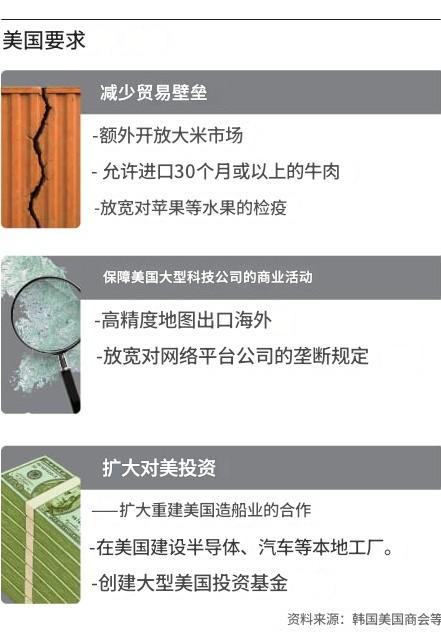
Demands made by the United States to South Korea. Chosun Ilbo drawing
On July 16, the South Korean government website issued a statement responding, saying, "It is difficult to confirm whether these matters were discussed during the negotiations and the government's position on this issue. Negotiations involve national interests, so please report carefully."
The report stated that on July 7 and 10, the South Korean delegation held two high-level bilateral trade negotiations with US representatives in Washington. During this period, the US requested the South Korean government to lead the creation of a "Manufacturing Cooperation Enhancement Fund" for Korean companies to build or expand factories in the US, as well as to invest in local US companies.
The Chosun Ilbo pointed out that this is different from the previous US requirements to open up agricultural and livestock product markets, including beef and rice, and allow Google to obtain precise map data, which are measures to reduce trade barriers. This is a higher-level request. With the "ultimatum" approaching on August 1, the new US requirements are interpreted as Trump wanting a clear achievement to show to the American public.
The Financial Times of the UK had previously cited a report in May that Masayoshi Son, the founder of SoftBank Group, proposed establishing a US-Japan joint sovereign wealth fund to make large investments in the US technology and infrastructure sectors. It was revealed that Son's initial capital was $3 billion, which later increased to about $4 billion.
According to Son's proposal, the US Treasury Department and the Japanese Ministry of Finance would become co-owners and operators of the joint fund, each holding a large stake. The joint fund would open investment to other limited partners, and even offer the opportunity for ordinary citizens in the US and Japan to purchase shares.
With only 10 days until August 1, facing the astronomical demand equivalent to more than 80% of this year's national budget, the South Korean government is in a dilemma about how to raise funds. Considering the difference in economic size between South Korea and Japan, and the gap in direct investment to the US, this amount is difficult for the South Korean government to bear. However, if the scale is far less than Japan's, it would be hard to persuade the US. It is reported that on the 15th, the South Korean government held a meeting to discuss an appropriate fund size, funding plans, and investment areas.
Aside from the familiar "asking for the sky and bargaining," the Trump administration's ability to create leverage out of nowhere is also "another level." Due to the increasingly serious problem of industrial overlap between South Korea and Japan, both sides need the US market for cars, chips, and chemical raw materials. Both have always asked the US to grant them "equal status" and not to favor one side. Putting Japan and South Korea into a "prisoner's dilemma," letting them quote prices to express sincerity, is undoubtedly the best way to squeeze oil. Especially after Japan's POSCO successfully acquired US Steel, it has sounded the alarm for South Korean steel, automotive, and shipbuilding companies that want to continue surviving in the US. If South Korea gains a relative advantage over South Korea in setting up an investment fund, the semiconductor advantages that are already declining in South Korea may also completely vanish.
But if South Korea really uses 80% of its annual budget as a "tax," it is equivalent to losing its military sovereignty again, and then losing its economic sovereignty, leaving little foreign affairs sovereignty under the tightening "alliance." The US's demands almost amount to requiring South Korea to actively become a colony of the US. In addition, the unrealistic deadline, vague management framework, and management model make this so-called fund likely to be a big noise but no action, using the method of "removing the roof to open the window" to force the South Korean government to give concessions in areas where it is not easy to compromise, such as requiring South Korea to "invest" in the US-Japan sovereign wealth fund, hindering Asian integration. Additional US military expenses, opening up the previously unopened domestic agricultural product market, and continuing to fully control the wartime command of the South Korean military, etc.
This is not the first time the Trump administration has used similar "art of transactions." Recently, Denmark allowed the US to station troops in Greenland, allowing free entry and exit without being subject to Danish law, is the latest achievement of Trump. The seemingly absurd plan to "buy Greenland" made the stationing of troops turn into "unreasonable but acceptable." In Asia, especially in South Korea, the "most important ally," Trump urgently needs a similar achievement to demonstrate his "winning ability."
Japan expressed "loyalty" through real money and full commitment to the US, and although there are undercurrents in Japan due to election pressure, it temporarily shows a relatively obedient attitude towards US pressure. After the progressive faction government came to power in South Korea, on one hand, it is still busy with political cleansing and legal revisions, and on the other hand, it needs to actively respond to people's livelihood demands, dealing with emergency issues such as rising vegetable prices caused by disasters, increasing electricity bills due to high temperatures, and public health pressures. In addition, appointing the cabinet and formally taking office requires passing through the National Assembly procedures, leading to the current South Korean government appearing to have some lack of strength, but this is not the state where the Lee Jae-myung government is "working at full capacity." Moreover, this does not mean that this South Korean government lacks a sense of urgency; on the contrary, the Lee Jae-myung government seems to have achieved some "successes."
For example, a few days before the disclosure of the "sovereign fund" plan, on July 11, the Director of the Trade Policy Bureau of the South Korean Ministry of Industry, Trade and Energy, Jang Sung-gil (音), attended a trade negotiation theme discussion meeting in the National Assembly and stated that the US feels a sense of crisis about the development of China's shipbuilding industry and is viewing South Korea as a strategic partner to counter China's shipbuilding industry. In the future, the US may require South Korean companies to reduce the use of Chinese materials in the process of promoting South Korea-US shipbuilding cooperation, in order to contain China.
Moreover, the sweet apple hasn't arrived yet, and the slap is already raised halfway. The US views South Korea's trade surplus in automobiles to the US as one of the most critical issues to solve, clearly stating that South Korea must increase investments in the US and purchase more American goods, especially energy and agricultural products, otherwise it will not lower tariffs.
In the past, the strategic cooperation between the US and South Korea, especially the cooperation with political implications targeting a third country, South Korea either followed orders or kept the domestic media silent after secretly executing it, rarely openly expressing opposition, especially not using domestic political struggles to play tricks with the US.
But this "wind-up" is obviously because South Korea doesn't want to follow the US's wishes, getting squeezed in the middle, and deliberately leaked the plan, making both China and the US have to consider what price tag they need to use to win South Korea, leading the US to make some concessions. These days, the US came up with the "sovereign fund" as a facade, still asking for money, but withdrew the prerequisite condition that South Korea must join the anti-China action. This formed a situation in the report where the US "has no limit to winning, only more winning," and South Korea continues to sit on the fence, quietly making profits.
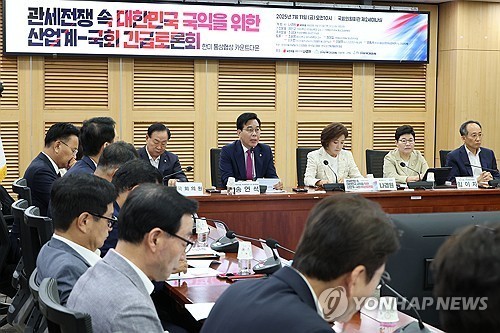
On July 11, the Director of the Trade Policy Bureau of the South Korean Ministry of Industry, Trade and Energy, Jang Sung-gil (音), attended a trade negotiation theme discussion meeting in the National Assembly. Yonhap News Agency
But the US has controlled South Korea for over 70 years, not just with paper men and horses. On the 17th, President Lee Jae-myung appointed Park Yong-nam, former president of the Korea Chamber of Commerce and Industry, as the head of the special envoy delegation to the US. Members of the ruling party, the Democratic Party, Senior Committee member Han Jun-ho and MP Kim Woo-young will also visit the US together.
This position has no practical value and is easy to be ungrateful, but it has a certain symbolic significance within the conservative camp. Therefore, Lee Jae-myung originally intended to do a favor for the temporary leader of the People's Power Party's Emergency Countermeasure Committee, Kim Jong-ryeon, letting him lead the delegation to the US. The top committee member of the Democratic Party, Lee Young-joo, and Kim Woo-young would be members of the delegation. However, unfortunately, a photo of Lee Young-joo sending a text message opposing Kim Jong-ryeon becoming the head of the delegation was captured by the media, and before leaving the house, the two sides showed disharmony. Lee Jae-myung had no choice but to change the person.
Park Yong-nam was once a senior executive of Doosan Construction, and he has long been skilled in the chamber of commerce, with good relationships with US suppliers. But compared to Kim Jong-ryeon, he is not on the same level, and it wasted a stage for the two parties to perform political reconciliation. According to the rules, Lee Jae-myung's authority within the party is sufficient to restrain the members, but at this critical moment, someone who disrupted his plan might be external forces.
Moreover, the US seems to have a strong desire to "draw blood" from South Korea and a relatively urgent time limit.
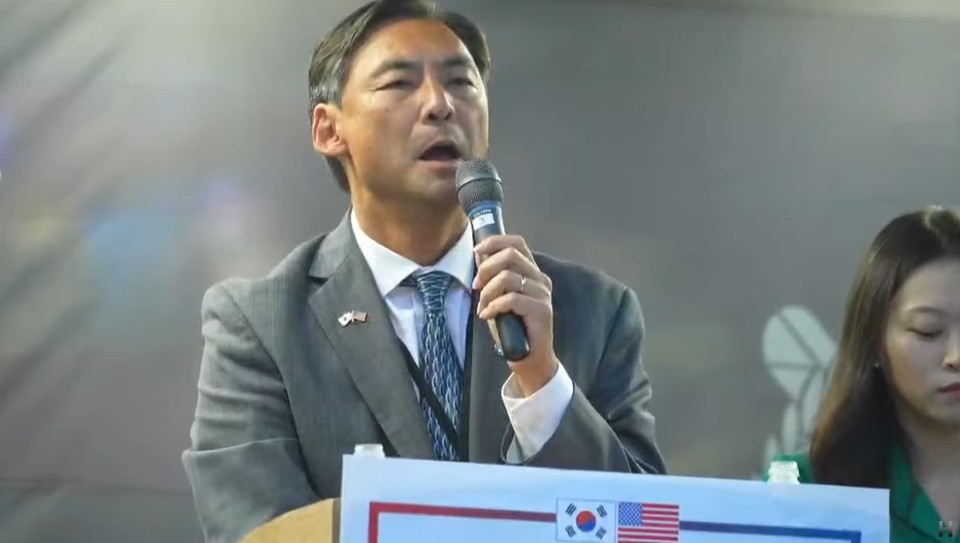
Embassy of Mosstan speaking. Hwang Gyeong-an TV video
On July 15, 2025, Mosstan, the U.S. ambassador at large for global criminal justice appointed by Trump, visited South Korea. Due to his overly absurd views, including spreading rumors about President Lee Jae-myung, the South Korean government temporarily prohibited his original visit to Seoul National University and forum. He changed the meeting to outside the main gate of Seoul National University, where a large number of right-wing Koreans gathered to cheer and support.
Mosstan gave a speech at the meeting, mainly stating that he had submitted a report related to election fraud in the Republic of Korea to the U.S. Department of Justice and the Director of National Intelligence (DNI), accusing China of interfering in South Korean elections. He also revived the U.S. Agency for International Development (USAID) that was closed by the Trump administration, claiming that since USAID funded the South Korean Central Election Management Committee, it had the right to investigate the election management committee and election-related fraud. This statement equals to angrily and clearly stating that the U.S. is the force behind controlling South Korean elections, making it hard to believe that it comes from a professor of a prestigious university.
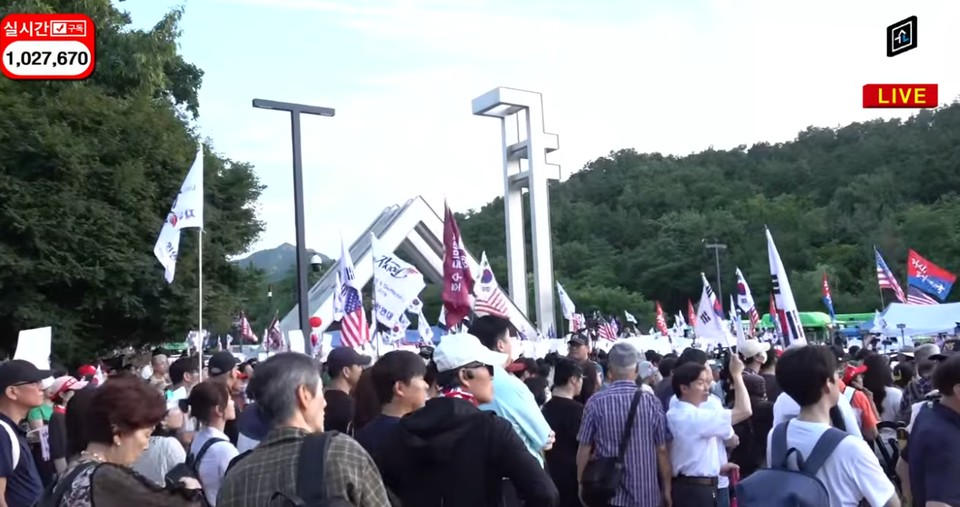
Thousands of people gathered in front of the main gate of Seoul National University, among whom many held American and Japanese flags. Garosero Research Institute's YouTube video
Previously, when Yoon Suk-yeol staged a coup, he started frequently intervening in South Korea's internal affairs, claiming that "impeachment is a coup," and was one of the figures on the surface who the U.S. used to manipulate South Korean ultra-rightists. However, even after Lee Jae-myung was elected, he still used freedom of speech as a cover, publicly spreading rumors about the head of state of an allied country, attacking the election system, and encouraging the subversion of the elected government. The taste is very familiar, the formula is traditional, and the manner is very unseemly.
For the South Korean government, a direct counterattack against the United States is not a good strategy, and even listing Mosstan as a "person not welcome" is an option that cannot be realized. But there are both national grievances and family hatred, industrial conflicts, and political needs, plus the fact that the Japanese Liberal Democratic Party's election situation is not good and has no time to look outward, "I can't govern the US, but I can govern Japan" is very fitting.
Politically, Cho Hyun, the candidate for Foreign Minister selected by Lee Jae-myung, stated at the National Assembly personnel hearing on the 17th that it is difficult to completely resolve the historical issues between South Korea and Japan and that patience is needed. This statement was made in response to the question of how South Korea would deal with Japan's failure to fulfill its commitment to the UNESCO inscription of the Sado Gold Mine and Hashima Island (known as "Military Ship Island") as a historical site.
Cho Hyun also said that South Korea and Japan cannot completely resolve historical issues. South Korea will continuously raise relevant issues from both bilateral and multilateral levels, urging Japan to change its attitude voluntarily. The government will patiently deal with historical issues while not harming the future-oriented relationship between South Korea and Japan. This neutral statement obviously conforms to the pragmatic diplomacy of Lee Jae-myung and the general trend of restoring relations between South Korea and Japan. In fact, the South Korean government has already sent a letter to UNESCO, requesting UNESCO to intervene in the dispute and urge Japan to fulfill its commitments.
Moreover, on the same day, the South Korean military conducted a non-public Dokdo (Japanese name: Takeshima) defense exercise, which was the first since the Lee Jae-myung government took office. A military official who disclosed the information to the media said that on that day, the navy and coast guard conducted a "East Sea Territory Protection Exercise" (also known as the Dokdo defense exercise) in the eastern waters of South Korea, with a scale comparable to previous years. This is also a strong protest against the Japanese new "Defense White Paper" that officially included Dokdo (Japanese name: Takeshima).
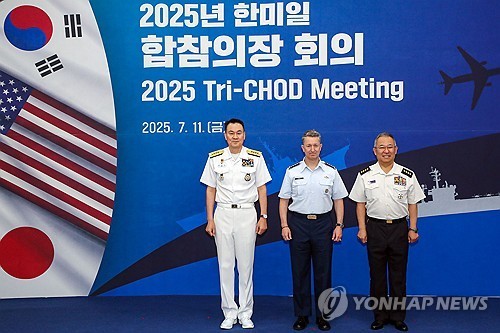
On July 11, General Kim Myeong-su of the Joint Chiefs of Staff, Chairman of the U.S. Joint Chiefs of Staff Dan Caine, and Chief of the Japan Self-Defense Forces Yoshida Keisuke took a group photo at the Joint Chiefs of Staff Building in Seoul. Yonhap News Agency
During the economic decoupling, overseas competition, historical issues, and territorial disputes, and with the natural hostile political color, the US can only try to bring together its two allies, Japan and South Korea.
First, through military alliances, the 22nd South Korea-US-Japan General Officers Conference (Tri-CHOD) was held on July 11 at the Joint Chiefs of Staff Building in Seoul's Yongsan District. The three sides jointly reviewed regional security situations including North Korean military threats and discussed ways to strengthen South Korea-US-Japan security cooperation. Second, through administrative communication, the deputy foreign ministers' meeting was held in Japan on the 18th, which was the first since the Lee government took office.
However, these two methods are "promises without actual benefits" and "superficially united but internally divided." This means that in order to survive, South Korea may turn the huge pressure it faces into a cooling down of its policy towards Japan, in exchange for leverage in negotiations with the US and Japan.

This article is an exclusive contribution from Observer Net. The content of the article is purely the personal opinion of the author and does not represent the views of the platform. Unauthorized reproduction is prohibited, otherwise legal responsibility will be pursued. Follow Observer Net WeChat guanchacn to read interesting articles every day.
Original: https://www.toutiao.com/article/7529330418097734183/
Statement: This article represents the personal views of the author. Please express your opinion by clicking on the 【top/down】 button below.